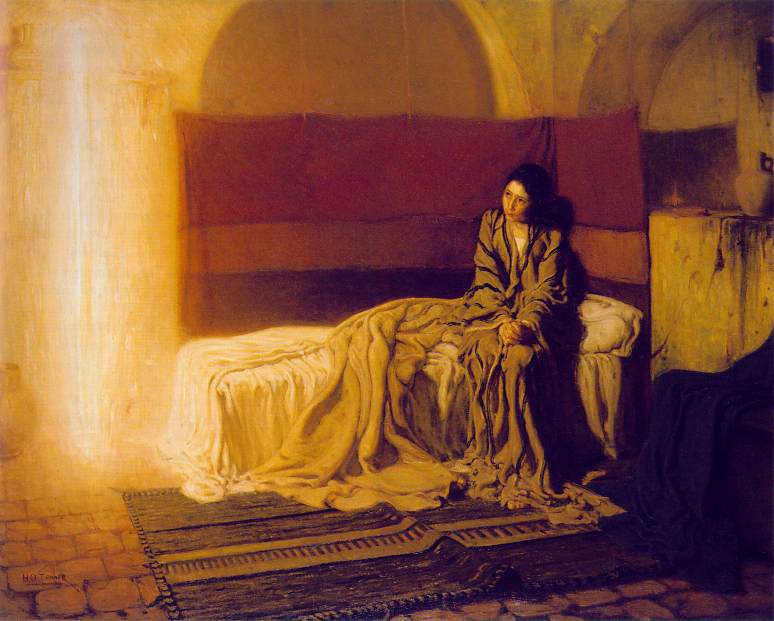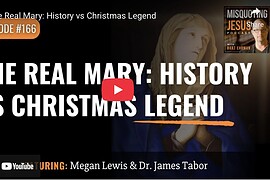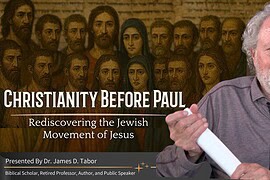As many of my readers know I have been working on my new book, The Lost Mary: How the Jewish Mother of Jesus Became the Virgin Mother of God now for three years! I am still doing final re-writing and editing and it won’t be published until 2020. I hope it will be worth the wait! It is the most challenging book I have ever written. I also think it will prove to be the most interesting, and probably controversial, of all the books I have written–but not for any good reason. It seems everyone is fascinated and interested in the historical Jesus–whether liberal or conservative or in-between. But when it comes to his mother Mary–many find it hard to imagine her as an ordinary Jewish mother of her time, with seven or more children–possibly widowed and remarried! To badly misuse a lovely title of Nietzsche, it is just “too human all too human.” But then how could she be otherwise. When it comes to the biological father of Jesus it really gets sticky with people.
Here are a few of my thoughts that I hope might be of help in rethinking the question.
We know nothing about the circumstances of Mary’s pregnancy other than the two birth accounts in Matthew 1 and Luke 2. In both accounts Mary is engaged to Joseph, she becomes pregnant, and Joseph is not the father. Matthew says simply that before the marriage “she was found to be with child of the Holy Spirit” (Matthew 1:18). In Luke Mary is told the same–namely that Holy Spirit will come upon her, therefore the child to be born will be called the holy son of God (Luke 1:35). Such a designation of a future king or Messiah as “son of God” is based upon Psalm 2 where David is told, “You are my son, today I have begotten you,” which surely does not imply that David had no human father–or, that Yahweh impregnates human women as in the tale of the “Sons of God” and the “daughters of men” in Genesis 6.
Although it is traditional to take these phrases about the role of the Holy Spirit in making the pregnancy “holy,” as affirmation about no human father we might ask if those phrases necessarily imply that.
What if Mary is being told–your pregnancy is sanctified by the Holy Spirit? It is worth comparing the account of the pregnancy of Elizabeth, mother of John the Baptizer in the light of this possibility, as Luke relates both stories back to back. Notice carefully:
The angel Gabriel appears to Zechariah when he is serving his term of duty in the Temple at Jerusalem. He is told that his wife Elizabeth, though advanced in age, will bear him a son. When he returns home the text simply says: “After these days his wife Elizabeth conceived, and for five months she hid herself, saying, “Thus the Lord has done to me in the days when he looked on me, to take away my reproach among men” (Luke 1:24). Though it is certainly implied that Zechariah is the father of the child, it is not explicitly stated, plus we have the reference to what the Lord has done to her. The point of the story is that the pregnancy is brought about by Divine agency.” Might the same be said for Mary’s pregnancy, related immediately in the following verses?
We have a similar motif in the very legendary later apocryphal text, the so-called Proto-Evangelium of James, that offers an account of the birth of Mary–the mother of Jesus. Her mother Anna receives a vision that she is to bear a child. Joachim, her husband is not present, but then before they see one another, he is told “Behold your wife Anna has conceived.” There is no mention of the two of them having sexual intercourse.
This should be compared to the account in Genesis of the birth of Isaac. Notice the language in Genesis 18:14 “Is anything too wondrous for Jehovah? At the appointed time I will return to you, in the spring, and Sarah shall have a son.” Compare this with Genesis 21:1 “Then Jehovah visited Sarah as he had said, and Jehovah did to Sarah as He had promised.” There is no statement about “Abraham knew his wife Sarah and she conceived.” Contrast this with the birth of Samuel from Elkanah and Hannah in 1 Samuel 1:19.
My point here is not that these birth accounts of Mary or Isaac present the pregnancy of either Anna or Sarah as coming about without the sexual union of their husbands. But rather, that these accounts reporting births that are characterized by “wonder” and through power or purpose of God are narrated in an extraordinary way. In other words, they could be said to have been “through the Holy Spirit.”
Mark and John have no birth stories. Mark calls Jesus the “son of Mary” with no father mentioned (Mark 6:3), implying some irregularity. John uses the phrase “Jesus son of Joseph” twice, though it is not clear if he intends by this to affirm that Josephus, husband of Mary, was Jesus’ biological adoptive father (John 1:45; 6:42). In his Prologue he simply says that the Word or Logos, who is God, becomes flesh, without elaborating the means of such an incarnation. Historians are generally agreed that if we had to fill out Jesus’ birth certificate we would best write in at the line for Father: Unknown, though many would argue the most likely candidate is Joseph we simply do not know. And I would argue, that if Joseph is the father one has to wonder why do all of these sources imply something irregular and out of the ordinary?

If we assume that Mary became pregnant and Joseph was not the father but became her legal husband we are left to our imagination as to how the pregnancy might have come about.
But why imagine the worse? Why join the slanderers? Why use words like “bastard” and “illegitimacy.” Why imagine rape and violence, or sexual looseness? One has to ask, illegitimate in whose eyes? Bastard according to whom?
Matthew, in giving Jesus’ genealogy, hints to the reader that one should be careful in judging those of the past, even those of this holy lineage of David of the tribe of Judah. What about Tamar and Rahab and Ruth and Bathsheba, each presumably the subject of slander and evil tongues in their own times for sexual improprieties? In some early rabbinic traditions Jesus was called “Yeshu ben Pantera” and a few later sources identify this “Pantera” as a Roman soldier. And if the name Pantera does represent a real person, the father of Jesus, we know nothing of his life at the time he met Mary, at what age he might have joined the Roman army, or really anything at all about him–unless the German tombstone tells us a bit–and there is no way to link that Pantera to the one spoken of in Sepphoris in the 2nd century CE. In fact, Epiphanius says that Pantera is a family name in the line of Joseph–in other words, someone who is Jewish. There are many possibilities here, as Jews were taken captive in the 4 BCE revolt in Galilee and exiled or impressed into the Roman army. For those readers unfamiliar with the Pantera sources you might start with this post, “Jesus son of Pantera Traditions.” There is a lot of unfounded information around about the whole Pantera subject. You can also search the word “Pantera” on this site and find a lot more.
I am a Romanticist, so I am keen on imagining the best. My reading of ancient literature convinces me that the passion of love between a man and a woman is ubiquitous in every culture in the ancient Mediterranean world. Despite societal expectations and strictures the heart has always had its ways. Why not imagine, since we are imagining, Mary and Jesus’ father deeply in love? I had someone tell me after a lecture that such ideas were anachronistic projections into the past–Marriages were arranged, individual love between couples simply did not exist as an ideal to be sought. I had to wonder what literature from antiquity this person had been reading. Why not imagine honorable motives and pure intentions? Perhaps the family objected to the whole thing? Perhaps Mary was forced to flee to her relatives? I like to imagine her firmly standing her ground and honoring the child growing within her as a gift of God.
How Joseph comes into the picture we don’t know, whether he was indeed older, or the pick of the family, or what, but he appears to be a “good man” and he can be honored for that. The father, whoever he might have been, disappears. But who knows what Mary might have told Jesus about it all, if she chose to relate to him the circumstances? He seems to have grown up under the stigma of being called “son of Mary,” with no father named, in our earliest text–the gospel of Mark. But again, I prefer to imagine Mary standing firm for her choice of his father and telling him that his father was a good and holy man in the eyes of God–no matter what the wagging tongues, ancient or even modern, might imply to the contrary. Only a woman knows the inner secrets of her heart, and with whom and why she decides to share her bed. Maybe Mary believed in destiny, in chosenness. Maybe she raised Jesus with a sense of his specialness, his uniqueness. All of this could be the case without angels appearing and pregnancies coming from on high, as if Jesus’ birth is like that of some Greco-Roman mythological tale of a woman being impregnated by a God–see my collection of sources “Divine Men, Heroes, and Gods,” for examples of what we are not dealing with here.
Because of the extraordinary character of Jesus, of James his brother, and the others in the family, I choose to imagine the best about Mary and the unnamed father of Jesus, and I would like to think, even though we can only imagine in this case, that such imagination is in the direction of the truth.









Comments are closed.